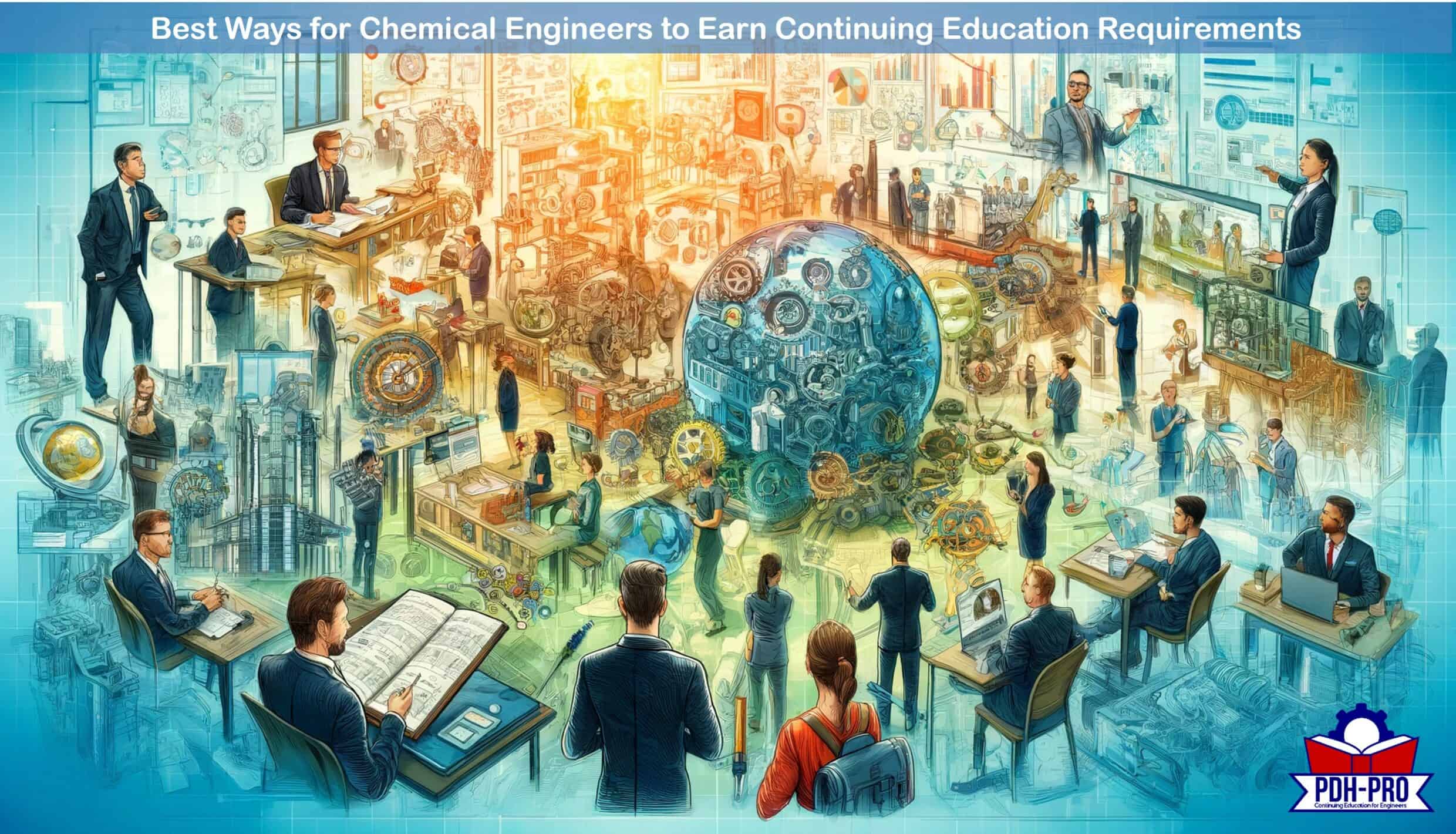CEU Requirements for Chemical Engineers
Chemical engineers who are renewing their PE license have many options for their chemical engineering PDH credits.
Chemical engineers must, on average, complete 15 hours of technically focused continuing education courses each year. State requirements vary, and some also require courses on ethics, state engineering laws, or professional behavior. Acceptable formats include online courses, live webinars, seminars, and college courses.
Thirty-nine states currently require professional engineers to earn professional development hours (PDHs), also known as continuing education units (CEUs), as part of their engineering license renewal. Each state board has their own chemical engineering continuing education requirements, but most rules are based on the NCEES standards which provide some level of consistency. This standardized set of CEU rules is helpful if you are an engineer who holds licenses in multiple states.
The most common source of engineering training comes from online continuing education providers, and many of these entities have developed programs specifically for chemical engineers. All states accept college courses towards CEU hours, making this a great option for you to meet your license renewal requirements while also earning a graduate degree. Additional sources of engineering CEUs you may want to explore include serving as an officer in a professional engineering society, writing an article for a peer-reviewed journal, and receiving a US patent.
This article provides you with a summary of the continuing education requirements for chemical engineers and offers strategies to simplify your PE license renewal.
Which Continuing Education Subjects are Appropriate for Chemical Engineers
When license renewal rolls around, many professional engineers wonder which continuing education courses are appropriate. A good starting point for this question is your state engineering board. We’ve spoken with engineering board members in many states on this subject to make certain our chemical engineering CEU courses meet their requirements and will be accepted. In general, the boards give a lot of discretion to professional engineers in determining whether a course meets the continuing education requirement. The overarching requirement is that the course must expand the engineer’s skill or knowledge. Some states impose additional requirements such as the course must be technical in nature or prohibiting topics such as general business or sales and marketing.
Another good guide is to see what continuing education courses other chemical engineers are taking. Popular subjects for chemical engineers include wastewater treatment, chemical safety, green and sustainable chemistry, and biofuels. Chemical engineers also earn CEU credits in state engineering rules and laws, engineering ethics and professional conduct, the NEC, and project management.
Chemical engineers also enjoy continuing education courses in the General Engineering category because there is a lot of overlap between engineering disciplines and these topics provide a way to fulfill the license renewal requirements.
Other Engineering Disciplines and Continuing Education Courses
 Can a chemical engineer take continuing education courses in another engineering discipline and still receive credit towards license renewal? We posed this question to ten state boards and the answer we got was – Yes. None of the state engineering boards we talked to prohibit an engineer from taking courses in another engineering discipline. In fact, several of the board members indicated that they view this as a positive use of the continuing education requirement and something they want to see more of. They noted that most engineering projects involve more than one engineering discipline. The cross-discipline training increases the overall understanding a chemical engineer has of other disciplines (civil, electrical, mechanical, structural, etc.) working on his/her project which contributes to improved public safety and a higher level of professionalism.
Can a chemical engineer take continuing education courses in another engineering discipline and still receive credit towards license renewal? We posed this question to ten state boards and the answer we got was – Yes. None of the state engineering boards we talked to prohibit an engineer from taking courses in another engineering discipline. In fact, several of the board members indicated that they view this as a positive use of the continuing education requirement and something they want to see more of. They noted that most engineering projects involve more than one engineering discipline. The cross-discipline training increases the overall understanding a chemical engineer has of other disciplines (civil, electrical, mechanical, structural, etc.) working on his/her project which contributes to improved public safety and a higher level of professionalism.
Chemical engineers may complete engineering continuing education courses in other engineering disciplines. It is important to note that every state engineering board has requirements for continuing education and it is your responsibility, as the professional engineer, to determine which courses are appropriate for you. A common continuing education requirement is that the course should be technical in nature (some states do not allow general business courses). The PDH credits should also expand your skills and knowledge as a professional engineer. A good way to confirm that a CEU will be accepted is to check with your state engineering board. Another good source is to contact the course provider about a particular engineering course. At PDH-Pro, we spend a lot of time and effort reviewing the state engineering board requirements to make certain our courses will be accepted.
As a chemical engineer, you can take advantage of the continuing education requirement to enhance your engineering competency and expand your knowledge to include additional disciplines.
Selecting a Continuing Education Course Format
Continuing education requirements for professional engineers have been around for many years, and the various course formats available has expanded as professionals ask for more interesting and informative classes. One of the most popular CEU formats is live engineering webinars. If you aren’t familiar with webinars, they are based on the traditional lecture style where the professor presents the course materials to students. The webinar is delivered via the internet with participants located remotely in their home or office. Many chemical engineers look for webinars to earn their PDH credits because this format is more interesting and allows students to interact directly with the instructor.
Chemical engineers currently earn the majority of their continuing education requirements using self-directed engineering courses. This format, also known as online courses, is accepted by most state engineering boards – although several restrict the number of CEU hours that can be earned this way. Online courses offer a lot of flexibility and convenience. You can complete the course on your own schedule and learn the course material at your own pace. In addition to chemical engineering webinars and online engineering PDH courses, you can also satisfy your CEU requirements by attending engineering conferences and seminars.
If you’ re looking for an unconventional way to earn engineering PDH credits, state engineering boards accept activities such as serving as an officer in an engineering organization or society, writing an engineering paper for a peer-reviewed publication, and being awarded a US patent for a technical-related invention. These methods are all suitable for earning chemical engineering continuing education credit and can be much more rewarding than attending a conference or seminar.
What Are State Engineering Boards Requirements
As a chemical engineer, you should be aware of the general guidelines and requirements that state engineering boards have, especially relative to online chemical engineering continuing education courses. As noted above, the states do not have continuing education requirements specifically for chemical engineers. However, your PDH courses should be related to engineering and technical in nature. They should also and improve and expand your knowledge of engineering.
As a professional engineering looking to renew your license, you have a lot of choices available. You can complete a college course, attend a conference or seminar, or (as most professional engineers do), you can complete online CE and PDH courses for chemical engineers. If you follow the path that other professional engineers take, you may want to try chemical engineering webinars as an interesting and rewarding approach to satisfy your PE license renewal. The best advice we can give is to develop a plan to meet your continuing education requirements and tie it to your career development goals. This will allow you to leverage two important objectives – renewing your engineering license and enhancing your professional career development.
What do Chemical Engineers Do?
A key objective of the chemical engineering discipline is turning raw materials into useful, everyday products. This branch of engineering is responsible for developing manufacturing processes to convert chemical feed stocks into the clothes we wear, foods and drinks we consume and the energy we use to power our homes and cars. Chemical engineers are responsible for understanding how these processes work developing methods efficiently use and manage the world’s resources – while simultaneously incorporating strategies to protect the environment and meet health and safety standards.
The History of Chemical Engineering: Crash Course Engineering #5 [8:59]
PBS Digital Studios talks about its history and evolution going from soda ash competitions to oil refineries and renewable energies. They also discuss some newer and emerging fields like biotechnology and pharmaceuticals.
Chemical engineers focus their energies on two broad categories of engineering work.
- the design, manufacture, and operation of plants and machinery
- the development of new and adapted substances and materials
This engineering discipline has recently become popular as universities all over the world report that the number of students who are enrolling in chemical engineering is on the rise.
What does a chemical engineer do?
A chemical engineer must be able to effectively handle a variety of technical and logistical tasks within the following criteria:
- The design and development of both chemical processes and equipment
- The optimization and control of industrial operations
- Plant operation and management
- Conduct both fundamental and applied research of substances from the molecular level
- Environmental management, monitoring, and pollution control
Qualities a chemical engineer should possess
Analytical skills – chemical engineers must be able to trace the root of the problem when things don’t work as expected. They use their analytical skills to ask the right questions and come up with solutions.
Creativity – chemical engineers must explore new ways of applying engineering principles.
Interpersonal skills – chemical engineers must develop good working relationships with other workers involved in production processes to ensure their work is completed in an efficient manner.
Industries for chemical engineers
Chemical engineers are in demand across the globe. The following companies employ a significant number of chemical engineers.
- Caltex/Shell (Petroleum)
- ANSTO (Nuclear Science and Technology)
- Siemens Water Systems (Membrane Purification)
- Port Jackson Partners (Engineering Consultants)
- Orica (Mining and Explosives)
- BOC (Gases)
The average annual wage for chemical engineers in the United States is $98,340.
Chemical Engineering Courses
As the leader in continuing education for professional engineers, PDH-Pro offers a range of chemical engineering courses for engineers looking to renew their license. Our comprehensive library of online and live webinar training courses are prepared by top industry leaders who share their knowledge in an intuitive and interactive manner. Select from a variety of topics including wastewater treatment, chemical safety, green and sustainable chemistry, and the NEC.
